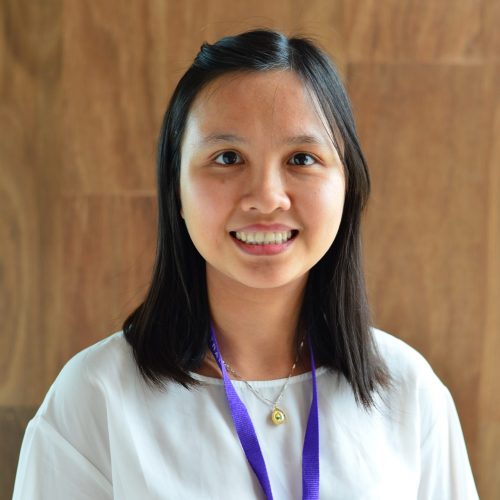
Loan Nguyen
The University of Queensland
Loan Nguyen is currently working as a lecturer at Vietnam National University of Agriculture. Her masters degree of Biotechnology at the University of Queensland in Australia was awarded in 2013. With great achievements from her master, Loan now holds a competitive UQ International Scholarship to support her PhD in the School of Chemistry and Molecular Biosciences. For her PhD, Loan is interested in understanding how genetics influence puberty in Brahman heifers, a dominant sub-species of cattle in tropical regions. Her PhD research has industry applications: finding potential candidate genes and furthering biological knowledge of puberty can help farmers improve the reproductive performance of Brahman heifers in Australia. In order to complete her PhD, Loan is well equipped with technologies: DNA sequencing, qPCR, genotyping, RNA sequencing and mass spectrometry as well as with bioinformatics tool.
Can you give me a quick overview of the type of mathematics you are studying and its potential impacts for the broader community
I am a PhD student at the University of Queensland, in the School of Chemistry & Molecular Biosciences. I am currently working on animal genetics. My project’s goal is to improve the reproductive performance of Brahman heifers in Australia. The research focuses on finding candidate genes and proteins as well as furthering biological knowledge of puberty in Brahman using computational strategies. This knowledge can bring the research one step closer towards the ultimate goal of enhancing genetics in Bos indicus cattle.
How important was receiving a CHOOSEMATHS grant in terms of your ability to attend and fully participate in the AMSI BioInfoSummer 2017 sessions throughout the week?
I knew about AMSI BioInfoSummer 3 years ago and I had chance to attend it in 2016 and in 2017. The CHOOSEMATHS Grant gave me opportunities to attend the full week and experience all sessions during the week. Attending talk sessions and networking events not only provided me opportunities to learn from lecturers and workshops but also gave me a chance to share my work and get advice from other fellows. Throughout the week, I also met experts who are working in the same area as well as different areas with me. Being able to network with these experts will open doors for my future career.
How important are initiatives such as the CHOOSEMATHS Grants in terms of fostering the participation and achievement of women in mathematics, particularly in terms of access to networking opportunities and further training opportunities?
I believe that CHOOSEMATHS give us, especially women, a place to meet other successful female scientists. Through this place, we then can encourage each other, participate in events, share knowledge and build a solid network.
In what ways has the experience impacted your maths studies? Has it influenced the direction of your research?
My background is in molecular biology and I am doing a PhD foussing on transcriptomic and proteomics. These high-throughput techniques generate a huge amount of data which I then need to use math, statistic and bioinformatics knowledge to handle. Attending BioInfoSummer 2017 gave me a broader understanding about research areas, current technologies: its advantage and disadvantage. Via this event, I can build my future direction for my research direction or career.
What was the most valuable part of AMSI BioInfoSummer 2017 for you in terms of furthering your career in mathematical sciences?
All sections of AMSI BioInfoSummer are valuable. Talks, lectures and poster presentations helped to broaden my knowledge in various area. The Career session brought me closer to successful female scientists and gave me a chance to learn from them. In terms of furthering my career in mathematical sciences, I think, the Combine Careers session was the most valuable part of AMSI BioInfoSummer 2017.
A presentation on the AMSI Intern program was included as part of the Careers Session. One of the aims of the AMSI Intern program is to maximise employability and help prepare research graduates to drive industry/private sector research. Are you hoping to work with industry? How important is this experience for researchers? Particularly in terms of offering career flexibility for women?
Working with industry may be a new challenge for me. It is quite different from academia. I started my first job as a lecturer in a University and then continued with my PhD overseas. But, If I have an opportunity to work with industry, I will definitely take it. There are huge varieties of different teams in industry, therefore, I can learn from experts in other disciplines and build up my knowledge.
Did you always want to pursue a career in maths? Were you encouraged to study these subjects at school? Do any particular mentors come to mind? Any outstanding teachers?
Honestly, I am not really good at maths. I completed my Bachelor and my master degree in Biotechnology. Therefore, my background is molecular biology. I started to learn about bioinformatics when I started my PhD project. It is so complicated but it is really helpful and powerful. I think Dr Toni Reverter helps and teaches me a lot. He is so smart and his knowledge encourages to learn and use bioinformatics tools for my study.
Where do you see yourself in five or ten years time?
I am going to complete my PhD soon. Therefore, my plan for my future career is to remain a researcher. Five years down the road I see myself growing into a senior researcher or lecturer where I think I will be able to use my skills to support, teach and help others.
